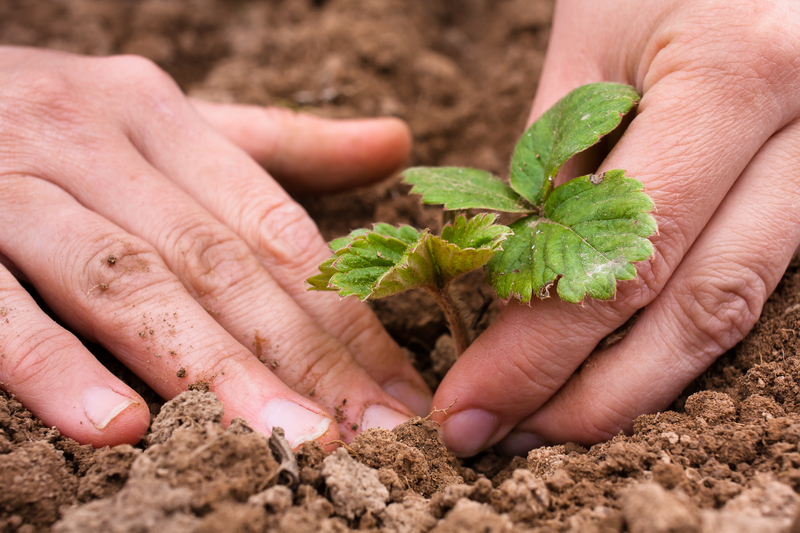Embrace Gardening as a Powerful Ally Against Climate Change
Posted on 03/07/2025
Embrace Gardening as a Powerful Ally Against Climate Change
Climate change is the defining environmental challenge of our time. Despite the growing urgency, many feel powerless to contribute meaningful solutions as individuals. However, there is an accessible, impactful, and nature-friendly response that each of us can harness: gardening. This comprehensive guide explores how embracing gardening in your daily life can become a powerful ally against climate change. Whether you are a seasoned gardener or a complete beginner, the benefits and strategies outlined below are sure to inspire and empower your green journey.

Why Is Gardening Important in Combating Climate Change?
Gardening may seem like a simple hobby, but it holds significant potential for reducing your carbon footprint and helping the planet. Let's break down its environmental impact:
- Plants absorb carbon dioxide: All plants, from trees to tiny herbs, absorb CO2 during photosynthesis, helping counter the excess greenhouse gases polluting our atmosphere.
- Gardens support biodiversity: Home gardens create habitats for pollinators and beneficial insects, supporting ecological resilience against climate disruptions.
- Gardening can reduce food miles: Growing your own fruits and vegetables decreases reliance on produce transported over long distances, slashing transportation emissions.
- Healthy soils store carbon: Well-managed garden soils lock away carbon and improve the earth's natural ability to regulate the climate.
By choosing to garden, you directly participate in climate action, one seed at a time.
The Science: How Gardening Fights Climate Change
Understanding the mechanisms through which gardening influences climate resilience unlocks even greater impact:
- Carbon Sequestration: Through the process of photosynthesis, plants remove carbon dioxide, a key greenhouse gas, from the atmosphere. When you plant trees, shrubs, and perennials, you create long-term carbon stores above and below ground.
- Reducing Urban Heat Islands: Gardens filled with vegetation cool down urban environments by providing shade and evaporative cooling, reducing reliance on air conditioning while lowering city temperatures.
- Soil Health and Carbon Storage: Garden soils, if enriched with compost and managed wisely, capture and store carbon. Practices like mulching and cover cropping further enhance this carbon bank.
- Biodiversity Support: Home gardens can host pollinators, birds, and small mammals. Increased biodiversity strengthens entire ecosystems, enhancing resilience against climate shocks such as droughts and pests.
Gardening for Climate: Practical Steps for Eco-Friendly Gardens
To truly embrace gardening as a means to combat climate change, it's important to employ climate-smart gardening techniques. Here are actionable steps and strategies:
1. Choose Native and Drought-Resistant Plants
- Why it matters: Native plants are adapted to local climates, requiring less water, fertilizer, and maintenance. They also provide essential habitat for native wildlife.
- How to do it: Research plants indigenous to your region. Replace water-intensive lawns with wildflowers, grasses, and shrubs native to your climate.
2. Start Composting
- Cut landfill waste: Organic kitchen and garden waste can be composted, diverting it from landfills where it would emit methane, a potent greenhouse gas.
- Enrich your soil: Compost improves soil structure, nutrition, and water retention, enhancing its capacity for carbon sequestration.
3. Minimize Chemical Inputs
- Chemical fertilizers and pesticides are fossil-fuel intensive, and their manufacture and application produce GHG emissions. Instead, choose organic and natural solutions.
- Encourage natural predators: Let beneficial insects handle pests and use companion planting to bolster plant health.
4. Practice Water-Wise Gardening
- Install rain barrels: Capture rainwater for use in your garden and reduce reliance on municipal water, which often requires energy-intensive treatment and delivery.
- Mulch your beds: A thick layer of organic mulch keeps soil cool, prevents evaporation, and gives beneficial organisms a home.
5. Grow Your Own Food
- Reducing food miles: The average meal travels thousands of miles before arriving at your table. With a vegetable patch or fruit trees, you "shorten the supply chain" and cut CO2 emissions dramatically.
- Eat with the seasons: Growing and eating what's in season and sharing surplus with neighbors fosters a local, low-carbon food culture.
Maximizing the Climate Benefits of Your Garden
To optimize your garden's climate-fighting abilities, apply these advanced principles:
Adopt Permaculture Principles
- Diversity: Mix vegetables, herbs, flowers, and shrubs for a resilient, self-supporting ecosystem.
- Care for the soil: Permaculture prioritizes mulch, cover crops, and compost to feed the soil, not just the plants.
- Water conservation: Design your garden to slow, sink, and store rainwater.
Go Peat-Free
- Why it matters: Peatlands are vital carbon sinks. Peat extraction for garden compost releases vast amounts of stored carbon into the atmosphere.
- What to do: Seek out peat-free composts or make your own using garden and kitchen waste.
Create Wildlife Corridors
- Hedge your bets (literally): Plant living hedges and minimize hard fencing to allow small mammals, birds, and insects to move freely between gardens, supporting wider biodiversity.
The Social and Mental Health Advantages of Eco-Conscious Gardening
The benefits of gardening extend beyond climate impact. By embracing sustainable gardening practices to fight climate change, you also promote:
- Mental wellbeing: Gardening reduces stress and anxiety, offering a green refuge amid climate headlines.
- Community building: Sharing seeds, produce, and knowledge with neighbors strengthens social bonds and builds a local network of climate action.
- Environmental education: Gardening provides hands-on learning for children and adults alike, fostering an environmentally conscious generation committed to sustainability.
Urban Gardening: Cities Join the Climate Fight
Most of the world's population lives in cities, yet urban gardening for climate protection is quickly gaining ground. Here's how city dwellers can take action:
- Window boxes and balconies: Utilize balconies, rooftops, and windowsills to grow herbs, flowers, or vegetables in containers, boosting greenery and cooling your living environment.
- Community gardens: Participate in or start a community garden, sharing resources and maximizing green space where land is at a premium.
- Urban orchards and food forests: Organize or support projects that plant fruit trees and edible shrubs in public spaces, greening the city while producing carbon-sequestering food.
Troubleshooting: Challenges and Solutions in Climate-Friendly Gardening
No journey is without obstacles! Here is how to overcome common hurdles in gardening against climate change:
- Lack of space: Try container gardening, vertical gardens, or join a community garden.
- Limited time: Focus on low-maintenance native perennials or edible plants that require less work.
- Poor soil quality: Build up raised beds with imported compost or start a lasagna garden using layered organic materials.
- Pests and disease: Practice crop rotation, encourage beneficial insects, and avoid chemical pesticides.
Gardening Innovation: Modern Tools for Climate Impact
Smart gardening tech can further boost your efforts:
- Soil moisture sensors: Prevent overwatering and maximize water efficiency.
- Drip irrigation: Deliver water right to the roots, saving time and reducing evaporation.
- Solar-powered garden gear: Use the sun to power lights, irrigation systems, and more.
- Mobile gardening apps: Identify plants, schedule watering, and track your garden's growth for better planning.
Sustainable Gardening: What the Experts Say
Many organizations and scientists endorse gardening as a climate solution. The Royal Horticultural Society and environmental agencies worldwide publish research on best practices for climate-smart gardening. Recent studies show that:
- Urban gardens can contribute significantly to city-level carbon capture.
- Switching to organic gardening reduces greenhouse gas emissions and improves resilience to climate stressors.
- Community gardening projects inspire collective environmental action and create climate-resilient neighborhoods.
Gardening may not solve climate change overnight, but when embraced by millions, it forms a vital, cumulative force for change.

Take Action: Start Your Climate Ally Garden Today
Ready to embrace gardening as a powerful ally against climate change? Follow these simple steps to begin your journey:
- Assess your space--yard, balcony, or even a windowsill will do.
- Choose climate-appropriate plants, prioritizing native and edible species.
- Set up a compost bin to recycle organic waste and enrich your soil.
- Commit to organic, low-input gardening practices.
- Join a community or online group to share tips, seeds, and inspiration.
Conclusion: Your Garden, Our Climate Future
Embracing gardening as a climate change ally empowers individuals to take control, cultivate sustainability, and make a measurable difference. Gardens absorb CO2, restore biodiversity, conserve water, and create healthier, happier communities. Together, our small actions multiply into a global movement for climate resilience.
Start your own regenerative garden today. Nurture your patch of the planet, and watch the seeds of climate hope grow.
Be a garden champion--be a climate champion.
Latest Posts
Explore the top 9 fast-growing hedges for privacy solutions
Designing a Safe Haven for Kids in Your Backyard
Shielding Your Garden from the Wrath of Severe Weather

